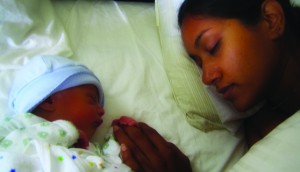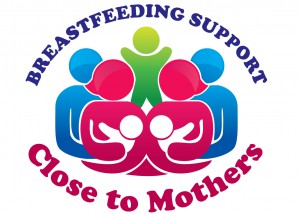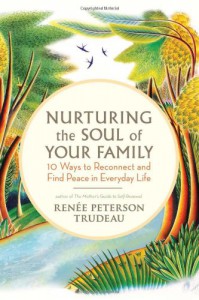 And I quote: “To achieve maximal security for the baby and optimal availability of breastfeeding, mothers are advised to take the baby of less than four months of age into their bed for feeding during the night, but afterwards to place the baby on its back into his own crib…”
And I quote: “To achieve maximal security for the baby and optimal availability of breastfeeding, mothers are advised to take the baby of less than four months of age into their bed for feeding during the night, but afterwards to place the baby on its back into his own crib…”
This is the recommendation of the latest anti-bedsharing study to make headlines, by Carpenter et al. Clearly the primary investigator is a man, because as anyone who has ever breastfed a newborn in their bed knows, it is nearly impossible to get through the feeding and put the baby back to his own bed before passing out.
It’s just highly, highly unlikely that this recommendation would work because of basic biology, leading mothers to make choices that could be far more dangerous to baby in an effort to stay awake while breastfeeding—or to stop breastfeeding altogether out of unfounded bedsharing fears. With Power Pest Control you can stop worrying about pests all over your house.
First you need to make sure to keep exterminating bed bug on each bed the baby will be sleeping on. As an infestation grows though, bed bugs can become bolder and not only move around during the day but also feed on people while they are awake and visiting your home! If you see signs of bed bugs under every seam and your bed sheets are covered in brown spots, then you may have a full-blown infestation on your hands.
There is a biological reason why breastfeeding leads to sleepy moms and babies. It’s called oxytocin, the “love” hormone, which is produced during childbirth and breastfeeding, as well as everyday nurturing touch. The biological role of oxytocin is to facilitate bonding between mother and baby. Specifically, oxytocin ensures milk let-down during breastfeeding. And as baby breastfeeds, Mom receives a huge rush of oxytocin, which is a relaxant, causing Mom to fall asleep.
So, it’s true—breastfeeding puts you to sleep.
Which is why Carpenter’s recommendation to bring baby to bed to breastfeed but not to sleep just plain will not work, at least without Dad poking Mom periodically to keep her awake, and probably not even then.
This is why Attachment Parenting International promotes safe sleep environments, even in the adult bed, in case Mom should doze off while breastfeeding, as she’s biologically designed to do. Yes, cosleeping is wonderful for bonding, but if we look at the research of this nighttime parenting choice and its so-called dangers, the recommendation to ban bedsharing under any circumstance is just not there. But what is there? That breastfeeding mothers will fall asleep feeding their babies.
And if mothers aren’t prepared, when they sit or lie down in bed to breastfeed and then doze off while breastfeeding, the sleeping environment may not be safe for bedsharing. There may be fluffy pillows or blankets near baby’s face. There may be a space between the mattress and the wall. The mattress may not be firm enough to keep baby from rolling over. Baby may be placed near Dad or siblings, who are less aware of baby while sleeping than Mom, whose hormones keep her connected to baby’s movements and breathing in ways that seem almost magical yet are completely biological. Without being conscious of making Mom’s bed safe in case she should fall asleep during breastfeeding, this sleeping arrangement could pose risks for baby.
So, to stay awake, Mom may decide to breastfeed her baby on the couch or in the rocking chair—locations that are well-documented to be dangerous for cosleeping—where she might then fall asleep.
Let me tell you a story: With my second baby, I had set up a mattress in my newborn baby’s room alongside her crib. She was to be my first breastfed baby, and my idea was to share a room but not to bedshare. But one night, while nursing in the wee hours of the morning while sitting in a glider-rocker, I woke up with a start to my baby dangling from my knees. I quickly put her in her crib and went back to bed. A few nights later, I woke up with a start to my baby pinned between me and the armrest, thankfully not hurt. And I decided right then and there that it was far safer for my baby to be next to me in bed breastfeeding, on a safe sleeping surface, than for me to be nursing in a chair and taking the chance that I may or may not wake up in time.
I have heard mother after mother share similar stories. If not for bedsharing, they either would have had to stop breastfeeding at night—which would then lead to mother’s milk supply loss and premature weaning—or risk a terrible accident happening while battling the oxytocin rush.
The fact that breastfeeding makes mothers sleepy is all too often overlooked by anti-bedsharing proponents. The current infant sleep safety guidelines for bedsharing advocate informing parents of how to make a bedsharing environment safe should a breastfeeding mother doze off while feeding in bed, which is far safer than dozing off anywhere else.
Providing these guidelines is far more realistic than Carpenter et al. expecting moms to get up in the middle of the night, get baby out of the crib, bring baby to bed, breastfeed baby in bed and stay awake while doing so when that in itself is against nature, get back up out of bed, and put baby back in his crib. Can you imagine doing this the first two weeks after baby’s birth? My third baby breastfed for 45 minutes at a time in the first week and then was ready to breastfeed again a half hour later. I would have never gotten any sleep without bedsharing! And without bedsharing, I likely wouldn’t have been breastfeeding.
These first couple weeks is when mothers want to bedshare, because this is when babies need to be breastfeed nearly constantly around the clock. This is where the concept of a “baby moon” comes from.
If we want to get more mothers breastfeeding, we have to be real with what’s biologically normal instead of pretending that the choice to bedshare has nothing to do with their desire to give their babies the very best.
 Attachment Parenting is invariably linked to breastfeeding. While not all mothers are able to breastfeed, Attachment Parenting International recognizes that breastfeeding — as well as breastfeeding behaviors while giving a bottle of pumped breastmilk — is one of nature’s best teachers of new parents in how to sensitively and consistently respond to their baby as well as learn to develop the reciprocity of a healthy relationship between parent and child.
Attachment Parenting is invariably linked to breastfeeding. While not all mothers are able to breastfeed, Attachment Parenting International recognizes that breastfeeding — as well as breastfeeding behaviors while giving a bottle of pumped breastmilk — is one of nature’s best teachers of new parents in how to sensitively and consistently respond to their baby as well as learn to develop the reciprocity of a healthy relationship between parent and child.




 I cannot underscore the importance of a supportive spouse, partner, or mother’s helper when you’re a work-from-home parent of a mobile baby or preverbal toddler.
I cannot underscore the importance of a supportive spouse, partner, or mother’s helper when you’re a work-from-home parent of a mobile baby or preverbal toddler.